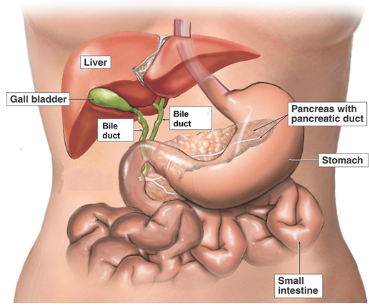If your cancer is in your bile ducts, please see our information on bile duct cancer (cholangiocarcinoma).
Gall bladder cancer
Gall bladder cancer affects about 50* people in Ireland each year. It is more common in older women.
Signs and symptoms
Learn about the signs and symptoms of gall bladder cancer. You are more likely to survive cancer if you find it at an earlier stage.
Treatments
There are a number of different treatments available for gall bladder cancer. Your medical team will explain the best treatment options for you.
What is gall bladder cancer?
When cancer develops in your gall bladder, the cells change and grow in an abnormal way. As the cancer grows it forms a collection of cells (tumour).
This tumour can cause a blockage and cause symptoms, such as jaundice. Gall bladder cancer is rare − about 50 people are diagnosed with it every year in Ireland.*
What is the gall bladder and what does it do?
The gall bladder is a small organ in your abdomen, just under your liver. It stores bile, which is a digestive fluid made by your liver. Bile breaks down fats during digestion in the small bowel (intestine).

Tiny tubes called bile ducts connect your gall bladder to your small bowel and liver. Together, the gall bladder and bile ducts are known as the biliary system. There are lymph nodes near the gall bladder. Cancer can spread to the lymph nodes which is why they are often removed during surgery. If there is cancer also in the lymph glands your doctor will use this information to stage your cancer and to decide what treatment is most suitable.

What increases my risk of gall bladder cancer?
The cause of gall bladder cancer is unknown. But there are certain things called risk factors that can increase your chance of developing the disease. These include:
Gall bladder cancer is more common in older people.
It is more common in females.
If you are overweight, you are more at risk of developing gall bladder cancer.
Smokers are more at risk than non-smokers.
If you have a first-degree relative with gall bladder cancer, you have a higher risk. But the risk is still small. A first-degree relative is a mother, father, brother, sister or child.
Heavy drinking increases your risk. The less you drink, the lower your risk of gall bladder cancer.
These problems include gallstones, an inflamed gall bladder, polyps (benign tumours), abnormal bile ducts, porcelain gall bladder (a build-up of calcium).
Having a risk factor doesn’t mean you will get cancer. Sometimes people with no risk factors get the disease. If you’re worried, talk to your GP or talk to one of our cancer nurses. Call our Support Line on 1800 200 700 or visit a Daffodil Centre.
Reducing your risk of gall bladder cancer
Things you can do to reduce your risk of gall bladder cancer include:
- Keeping a healthy weight for your height
- Not smoking
- Avoid alcohol or limit it to within the low risk guidelines (no more than 11 standard drinks a week for women and people assigned female at birth, 17 for men and people assigned male at birth).
Continue reading about gall bladder cancer
Talk to a Cancer Nurse

Support Line
Our Daffodil Centres

*The Irish Cancer Society uses the most up-to-date cancer statistics from the National Cancer Registry Ireland, available on www.ncri.ie
